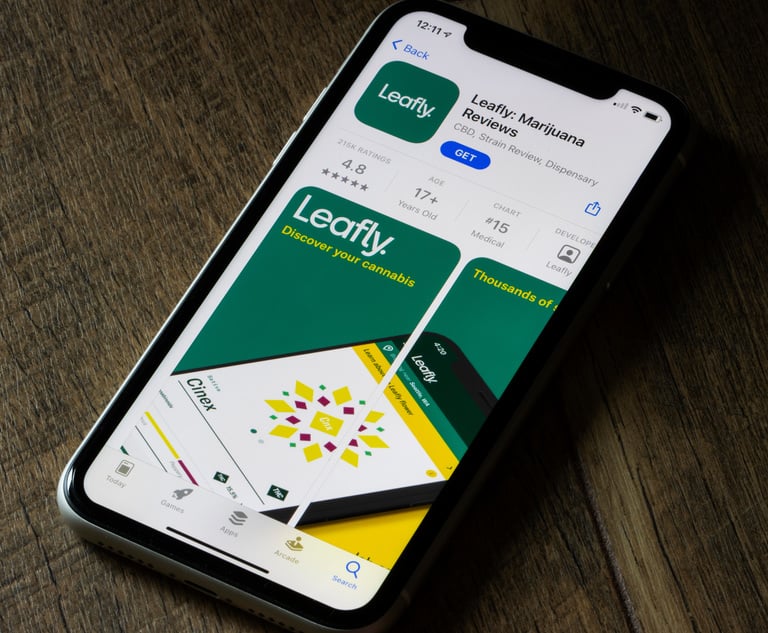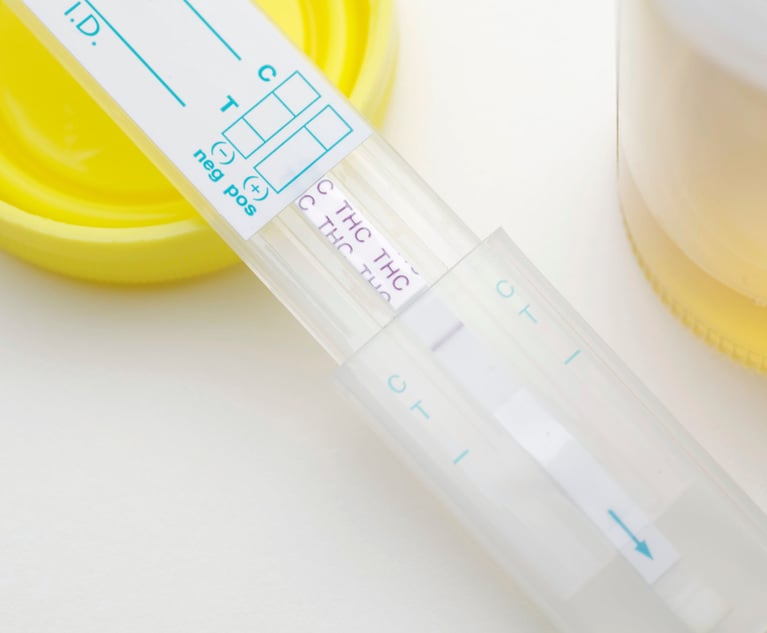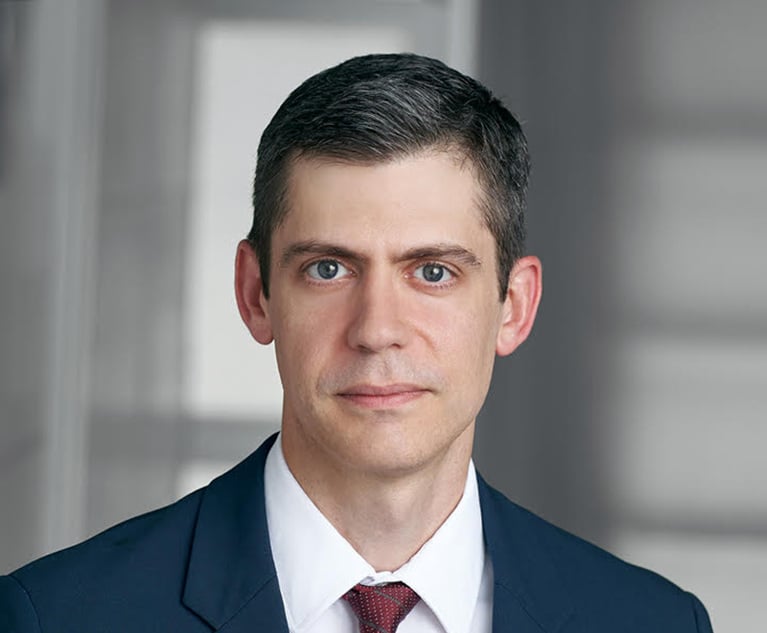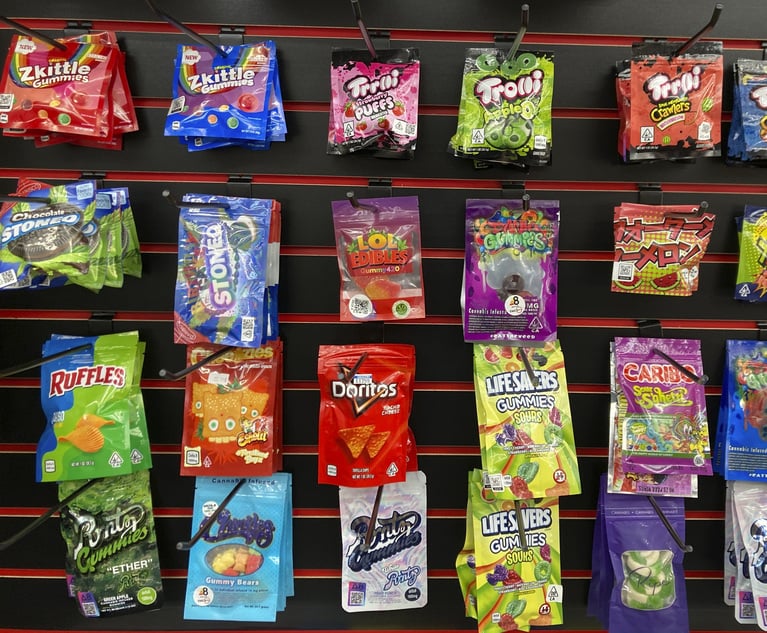Higher Law: Hogan Lovells' Neal Katyal Takes Hemp Appeal | CBD Confusion | Squire Patton's Pot Play
We're closely following the big hemp case in the Ninth Circuit, where a Hogan Lovells team—including Neal Katyal—just made their appearances. Plus: Squire Patton Boggs has a new cannabis lobbying client. Scroll down for Who Got the Work, and more. Thanks for reading Higher Law!
March 21, 2019 at 04:00 PM
10 minute read
Welcome back to Higher Law, our weekly briefing on all things cannabis. I'm Cheryl Miller, reporting for Law.com from Sacramento. May your NCAA brackets enjoy one shining moment.
This week we're all about CBD and hemp. We talk with a regulatory and compliance attorney for his take on the confusing legal world of CBD-infused foods. And a Colorado hemp company hires some big legal names in its fight to get back a very pricey load of seized product. Plus, Squire Patton Boggs makes it official and registers to lobby for a major cannabis advocacy group.
Thank you for reading. Please keep sending me your feedback, tips and tournament upset picks. Drop me a line at [email protected]. Or you can call me at 916-448-2935. Follow me on Twitter at @capitalaccounts.

CBD and the FDA: Confusion Reigns
Almost everyday I get an email pitch about some CBD-infused drink or snack: beer, powder additives, kiwi juice, coffee, cat treats—you name it. And each time I think to myself, a) would my cat really go for CBD-laced nibbles, and b) can these products pass regulatory muster?
To answer the second question, I checked in with Jonathan Havens, co-chair of Saul Ewing Arnstein & Lehr's cannabis practice.
“I have not come across an issue that is this fraught with confusion in a long time, maybe ever,” said Havens, a former regulatory counsel at the U.S. Food and Drug Administration.
Some of that confusion started in December when Congress, as part of the farm bill, gave its blessing to industrial hemp. But that didn't make hemp-derived CBD food additives instantly legal. In fact, on the same day President Trump signed the farm bill, the FDA issued a statement gently reminding everyone that “Congress explicitly preserved the agency's current authority to regulate products containing cannabis or cannabis-derived compounds.”
 Jonathan Havens
Jonathan Havens“The FDA views CBD as something that was studied in a substantial clinical trial when they approved Epidiolex, which is a CBD-based drug,” Havens said. “And so they say, 'Look, under the Food, Drug, and Cosmetic Act we don't think you should be able to put a drug ingredient into food.”
But CBD is a potential $16 billion market in the U.S., and lawmakers with concerned business constituents pressed FDA Commissioner Scott Gottlieb in February to re-examine its position. Gottlieb agreed and said his agency would hold hearings on CBD-infused foods in April.
Soon after, Gottlieb announced he would leave the agency on April 5. So does the review of CBD and food go with him?
“My fear and that of other people in the industry who want more certainty about what they can do, and don't like the answers the agency has given so far, my fear is that this just gets delayed because of his departure,” Havens said.
So how should a lawyer advise clients eager for a piece of the CBD action?
First, Havens said, companies should be wary of making grandiose medical claims about their CBD products; the FDA may have limited resources but it has gone after manufacturers making unproven promises about effects.
Second, watch out for state enforcement, he said. Local agencies and states from San Francisco to Maine have forced stores to remove CBD-infused foods from their shelves. (California is considering legislation to change that.) Other states, including Idaho, have not welcomed hemp shipments moving through their borders. Shippers should be able to document the precise source of their products and to produce bills of lading and certificates proving the goods' THC content is under 0.3 percent, he said.
“There are some states where even though the farm bill has passed, they don't like CBD, they don't like hemp,” Havens said. “And they think that until the [U.S. Department of Agriculture] issues regulations that forces them to allow this stuff they don't have to allow it in their state.”
>> The U.S. Postal Service recently issued guidelines for mailing CBD oil and products. Cannabis law attorney Rob Kight has a copy of the advisory and some thoughts on the required mailing steps on his blog, Kight on Cannabis

'Big Sky' Hemp Fight Draws Big Law Team
Big Sky Scientific has added some big legal names to its suit seeking the return of $1 million worth of hemp that was seized by Idaho police in January.
Hogan Lovells partners Neal Katyal (above) and Sean Marotta joined a Stoel Rives team Wednesday on a Ninth Circuit brief that argues Chief U.S. Magistrate Judge Ronald Bush of the U.S. District Court in Idaho got it wrong last month when he declined to order the state of Idaho to hand back the hemp.
“This appeal asks whether the State of Idaho has the authority under its Controlled Substances Act to seize legally grown and purchased hemp that was in Idaho only because it was being transported through the state in interstate commerce,” Stoel Rives partner Christopher Pooser wrote. “The answer is no.”
Idaho police nabbed Big Sky Scientific's cargo, and jailed its driver on a felony trafficking charge, as it was shipping from a cultivation site in Oregon to a processing facility in Oregon. The state contends that under its laws any product that contains THC—even if it's less than 0.3 percent, like hemp—is illegal.
The case is shaping up to be one of the first tests of the 2018 farm bill's legalization of hemp. The defendants, the Idaho State Police, Ada County and Ada County Prosecuting Attorney Jan Bennetts, are scheduled to file their answering brief by April 17. They are represented by Sherry Morgan, Ada County senior deputy prosecuting attorney,and attorneys Merritt Dublin and Cynthia Yee-Wallce of the Idaho attorney general's office.

In the Weeds…
• “These companies are testing the limit—and bragging about it” in Massachusetts. ”State policy makers failed to foresee just how hard it would be to control giant investors, often aided by well-paid lobbyists and lawyers, in a field that now has its own Marijuana Index to track the biggest cannabis companies in North America.” [Boston Globe]
• Can an employer be sued by a worker's widow for not enforcing a no-drugs policy? No, an Ohio court said. A Ford Motor Co. employee collapsed on the job and later died at a hospital. A toxicology report indicated he had marijuana and fentanyl in his system, plus a .08 blood alcohol level. The man's widow sued Ford, alleging that its failure to enforce an anti-substance-abuse policy induced workers to use drugs in the workplace. An appellate court held that the widow failed to allege that Ford deliberately intended to hurt her husband. [Law.com]
• Light 'em up, Florida. Gov. Ron DeSantis this week signed into law a bill ending the state's ban on smokable marijuana. Orlando trial lawyer John Morgan sued to overturn the smoking ban, arguing that it violated the medical marijuana measure voters approved in 2016. After taking office in January, DeSantis said that if lawmakers did not repeal the smoking ban by March 15, he would drop the state's appeal of a ruling in Morgan's favor. [Daily Business Review]
• A vote on New Jersey legalization could come Monday. The New Jersey Cannabis Regulatory and Expungement Modernization Act includes an excise tax of $42 an ounce on recreational sales and expungement provisions for pending charges and past convictions. A five-member commission appointed by the Legislature and the governor will oversee regulations [New Jersey Law Journal]
• Massachusetts regulators don't have the power to void community marijuana contracts. Superior Court Judge Timothy Feeley said the Cannabis Control Commission can't review deals, known as host community agreements, between towns and marijuana companies. Critics have complained that some locals are charging exorbitant fees that are unfair to small would-be operators. [The Boston Globe]
• As Illinois contemplates legalization, lawyers are in high demand. “It's really a unique opportunity for lawyers because unlike just about anything we do … once we get into cannabis, we're really in uncharted territory,” Hoban Law Group counsel Larry Mishkin told the Daily Herald. “There's a real demand for lawyers who understand the laws and how the cannabis rules affect what are the normal everyday rules,” Mishkin said. [Daily Herald]

Who Got the Work
• A team from Squire Patton Boggs has formally registered to lobby for the National Cannabis Roundtable. The lobby team includes David Schnittger, former deputy chief of staff to U.S. Rep. John Boehner; Natasha Hammond, former assistant for policy for former House Speaker Paul Ryan; Lem Smith, legislative director to the late Rep. Charlie Norwood, R-Georgia; and Bret Boyles, chief of staff to former U.S. Sen. Trent Lott.
• The former COO of Ohio's medical marijuana program has joined a major cannabis cultivator and processor in the state. Justin Hunt is now executive vice president at Grow Ohio Pharmaceuticals, The Cincinnati Enquirer reported. Hunt is barred from representing Grow Ohio before any state agency for a year after his departure from the Ohio Medical Marijuana Control Program.
• “Legalizing recreational or adult-use marijuana is one of the top priorities of New York Gov. Andrew Cuomo and state lawmakers in the current legislative session, which runs through June. And influencing the laws and regulations that emerge is a top priority for local farmers,” Park Strategies lobbyist Joe Rossi, representing the New York Cannabis Growers and Processors Coalition, told WNYC.

Your Calendar: All the Things
March 22-24: The New England Canna Convention will take place in Boston. Scheduled speakers include Vicente Sederberg partner Valerio Romano and Steve Schain, senior attorney at Hoban Law Group.
March 26: The U.S. House Committee on Financial Services will convene a markup of the SAFE Banking Act at 2 p.m. EDT. The bill would provide legal protections for banks that serve state-licensed marijuana businesses.
March 27: California's Cannabis Advisory Committee meets in Sacramento. Members will hear a presentation on worker health and safety in the cannabis industry.
March 28: The National Cannabis Bar Association hosts the webinar ”The Future of Cannabis and International Law.” The speaker will be Heather Haase, the International Drug Policy Consortium members' link to UN Headquarters on drug policy issues.
This content has been archived. It is available through our partners, LexisNexis® and Bloomberg Law.
To view this content, please continue to their sites.
Not a Lexis Subscriber?
Subscribe Now
Not a Bloomberg Law Subscriber?
Subscribe Now
NOT FOR REPRINT
© 2025 ALM Global, LLC, All Rights Reserved. Request academic re-use from www.copyright.com. All other uses, submit a request to [email protected]. For more information visit Asset & Logo Licensing.
You Might Like
View All
NY Cannabis Marketing Rulings / Rescheduling Effects / Honigman's Work on Trademark Suit / Goodbye
9 minute read
Workplace Weed and Labor Pacts / State AGs and Hemp / Maryland Licensing Suit / Vicente Sues Recruiter
9 minute readTrending Stories
- 1New York-Based Skadden Team Joins White & Case Group in Mexico City for Citigroup Demerger
- 2No Two Wildfires Alike: Lawyers Take Different Legal Strategies in California
- 3Poop-Themed Dog Toy OK as Parody, but Still Tarnished Jack Daniel’s Brand, Court Says
- 4Meet the New President of NY's Association of Trial Court Jurists
- 5Lawyers' Phones Are Ringing: What Should Employers Do If ICE Raids Their Business?
Who Got The Work
J. Brugh Lower of Gibbons has entered an appearance for industrial equipment supplier Devco Corporation in a pending trademark infringement lawsuit. The suit, accusing the defendant of selling knock-off Graco products, was filed Dec. 18 in New Jersey District Court by Rivkin Radler on behalf of Graco Inc. and Graco Minnesota. The case, assigned to U.S. District Judge Zahid N. Quraishi, is 3:24-cv-11294, Graco Inc. et al v. Devco Corporation.
Who Got The Work
Rebecca Maller-Stein and Kent A. Yalowitz of Arnold & Porter Kaye Scholer have entered their appearances for Hanaco Venture Capital and its executives, Lior Prosor and David Frankel, in a pending securities lawsuit. The action, filed on Dec. 24 in New York Southern District Court by Zell, Aron & Co. on behalf of Goldeneye Advisors, accuses the defendants of negligently and fraudulently managing the plaintiff's $1 million investment. The case, assigned to U.S. District Judge Vernon S. Broderick, is 1:24-cv-09918, Goldeneye Advisors, LLC v. Hanaco Venture Capital, Ltd. et al.
Who Got The Work
Attorneys from A&O Shearman has stepped in as defense counsel for Toronto-Dominion Bank and other defendants in a pending securities class action. The suit, filed Dec. 11 in New York Southern District Court by Bleichmar Fonti & Auld, accuses the defendants of concealing the bank's 'pervasive' deficiencies in regards to its compliance with the Bank Secrecy Act and the quality of its anti-money laundering controls. The case, assigned to U.S. District Judge Arun Subramanian, is 1:24-cv-09445, Gonzalez v. The Toronto-Dominion Bank et al.
Who Got The Work
Crown Castle International, a Pennsylvania company providing shared communications infrastructure, has turned to Luke D. Wolf of Gordon Rees Scully Mansukhani to fend off a pending breach-of-contract lawsuit. The court action, filed Nov. 25 in Michigan Eastern District Court by Hooper Hathaway PC on behalf of The Town Residences LLC, accuses Crown Castle of failing to transfer approximately $30,000 in utility payments from T-Mobile in breach of a roof-top lease and assignment agreement. The case, assigned to U.S. District Judge Susan K. Declercq, is 2:24-cv-13131, The Town Residences LLC v. T-Mobile US, Inc. et al.
Who Got The Work
Wilfred P. Coronato and Daniel M. Schwartz of McCarter & English have stepped in as defense counsel to Electrolux Home Products Inc. in a pending product liability lawsuit. The court action, filed Nov. 26 in New York Eastern District Court by Poulos Lopiccolo PC and Nagel Rice LLP on behalf of David Stern, alleges that the defendant's refrigerators’ drawers and shelving repeatedly break and fall apart within months after purchase. The case, assigned to U.S. District Judge Joan M. Azrack, is 2:24-cv-08204, Stern v. Electrolux Home Products, Inc.
Featured Firms
Law Offices of Gary Martin Hays & Associates, P.C.
(470) 294-1674
Law Offices of Mark E. Salomone
(857) 444-6468
Smith & Hassler
(713) 739-1250










